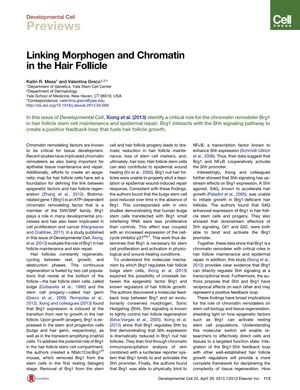TLDR Brg1 is crucial for keeping hair follicle stem cells and repairing skin, working with the Sonic Hedgehog pathway to promote hair growth.
In the 2013 study by Xiong et al., the chromatin remodeler Brg1 was found to be essential for the maintenance of hair follicle stem cells and epidermal repair. The study revealed that Brg1 interacts with the Sonic Hedgehog (Shh) signaling pathway to create a positive feedback loop that promotes hair follicle growth. The absence of Brg1 led to a significant decrease in hair follicle maintenance, loss of stem cell markers, and hair loss. Furthermore, Brg1 null hair follicles failed to respond to depilation or wound-induced repair. The research also showed that Brg1 regulates Shh expression by activating its promoter, while Shh signaling increases Brg1 expression in hair follicle stem cells, indicating a crucial reciprocal relationship for hair follicle maintenance and epidermal repair.
 52 citations
,
April 2013 in “Developmental Cell”
52 citations
,
April 2013 in “Developmental Cell” Brg1 is crucial for hair growth and skin repair by maintaining stem cells and promoting regeneration.
 305 citations
,
June 2012 in “Nature”
305 citations
,
June 2012 in “Nature” Hair regeneration needs dynamic cell behavior and mesenchyme presence for stem cell activation.
1279 citations
,
November 2005 in “Nature Medicine”  113 citations
,
September 2005 in “Journal of Investigative Dermatology”
113 citations
,
September 2005 in “Journal of Investigative Dermatology” Applying a special compound can promote hair growth without harmful side effects.
 52 citations
,
April 2013 in “Developmental Cell”
52 citations
,
April 2013 in “Developmental Cell” Brg1 is crucial for hair growth and skin repair by maintaining stem cells and promoting regeneration.
 January 2018 in “Stem cell biology and regenerative medicine”
January 2018 in “Stem cell biology and regenerative medicine” The nucleus is key in controlling skin growth and repair by coordinating signals, gene regulators, and epigenetic changes.
 182 citations
,
August 2016 in “Development”
182 citations
,
August 2016 in “Development” ATP-dependent chromatin-remodeling complexes are crucial for gene regulation, cell differentiation, and organ development in mammals.
7 citations
,
May 2022 in “Frontiers in Cell and Developmental Biology” Epigenetic and metabolic changes affect stem cell function and aging in skin.
 106 citations
,
March 2014 in “BioEssays”
106 citations
,
March 2014 in “BioEssays” We need more research to better understand human hair follicle stem cells for improved treatments for hair loss and skin cancer.






